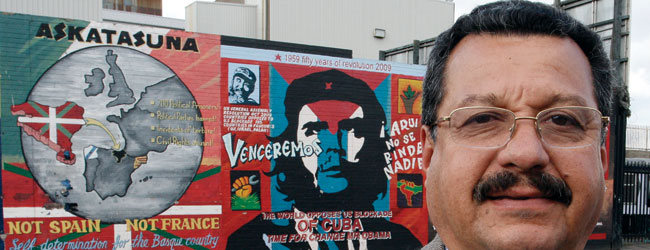28 October 2010
INTERNATIONAL | ‘COLOMBIANS FOR PEACE’ ACTIVIST MEETS PARTIES IN NORTH
Learning from Ireland to help build peace in Colombia

‘Colombians for Peace’ activist Carlos a Lozano Guillen with An Phoblacht at the International Wall on the Falls Road in Belfast
g BY PEADAR WHELAN
A COLOMBIAN peace activist and director of the biggest-selling left-wing journal in his country, Carlos A Lozano Guillen, made a fact-finding visit to the Six Counties in recent weeks and met Sinn Féin Junior Minister Gerry Kelly as well as representatives of the SDLP and the unionist parties.
He was keen to hear Sinn Féin’s efforts to build and develop the Peace Process from the preliminary contacts with the British in the 1990s through to the present day.
He spoke to An Phoblacht in the party’s headquarters on the Falls Road and outlined the difficulties he has encountered over the years as he and people like him try to move Colombia from being a country at war to a country where equality and justice are the cornerstones of peace and democracy.
Carlos is a member of the Executive Committee of the Colombian Communist Party (PCC). He is also the director of Voz, the PCC’s weekly newspaper with a nationwide circulation and in existence since 1957.
He was also involved with the organisation Colombians for Peace. Which hoped to broker a peace process between the country’s main guerrilla organisations - the FARC (Revolutionary Armed Forces of Colombia) and the ELN (National Liberation Army) - and the Colombian Government.
“Colombians for Peace is a pluralistic movement made up of intellectuals, academics and others who are interested in the struggle for peace,” Carlos explained.
He said the group wants all parties to the war to adopt human rights accords and they engaged with the guerrillas to persuade them to release some of the hostages they were holding in their jungle bases.
Last year, in a well-publicised and internationally-received move, the guerrillas freed up to 20 people. But the government of President Álvaro Uribe Velez did not reciprocate.
“There was no proper response from the Government,” Lozano said, accusing the government of “provocation” and of sabotaging the work of Colombians for Peace.
Another obstacle to peace in the South American country is the refusal of the ruling class to contemplate any kind of compromise with the guerrillas.
“Their only objective is the total surrender of the guerrillas.” Carlos told An Phoblacht. “The only thing on their agenda is a return to their total control of the country. They are ultra right-wing. They are supported by the military and the United States and they have done everything they could over the last 30 years to shut down the democratic space to defend their neo-liberal interests.”
The role of the United States is a major stumbling block to any efforts to develop a peace process.
United States government after United States government has played a negative if not destructive role in the politics of Central and South America. Since 1962, when John F Kennedy forced Latin American countries to change their military doctrines from national defence to counter-subversion, the role of the death squads has been dominant.
The added imperative for the United States now is to counter the forces of change unleashed by the election of Hugo Chávez in Venezuela.
“The Americans want to build up to seven military bases in Colombia to challenge Venezuela,” said Carlos Lozano.
Rubbishing the idea that the war in Colombia is about drugs, Lozano pointed out that the war began in 1948 when the Liberal Party Presidential candidate Jorge Eliécer Gaitán Ayala was assassinated. He was a champion of the poor and on hearing of his killing thousands took to the streets of Bogota. Bloody rioting, dubbed ‘El Bogotaza’, ensued. It was the start of the civil war between the dominant class and the forces of change.
Said Lozano:
“The propaganda that it is a drugs war is disinformation. The drugs gangs were controlled by the ruling elite. Pablo Escobar, one of the more notorious drugs barons, was an MP. The US used the drug cartels from Colombia to fund the Contras’ campaign against the Sandinistas in Nicaragua.
“The reality is that FARC and the ELN emerged out of the social conditions in Colombia and the notion that it is a war against drugs is a pretext being used by the United States to further its military aims in the region.”
At a personal level, Lozano lives under constant threat from the death squads. “There are threats against the paper, Voz, threats against the Communist Party, threats against Colombians for Peace, death threats every day. I have them with my breakfast every morning. It is drip, drip, drip. It goes on all the time.”
Concluding the interview with An Phoblacht, Lozano described his trip to Ireland as “useful, very useful”.
“I met the various parties and found out that trying to get talks going was very difficult. Agreeing on what people want to discuss is a big obstacle but it is encouraging to see that a peace process can work.
“The one thing that everyone agreed on was that conflict cannot be resolved militarily.
“I recognise the input of Sinn Féin in establishing the parameters for negotiations and agreement.
“I am pleased for you, the people of Ireland, and hope you consolidate the peace. On behalf of the Colombian people, we want peace, democracy and national independence for our country.”
Follow us on Facebook
An Phoblacht on Twitter
Uncomfortable Conversations

An initiative for dialogue
for reconciliation
— — — — — — —
Contributions from key figures in the churches, academia and wider civic society as well as senior republican figures




